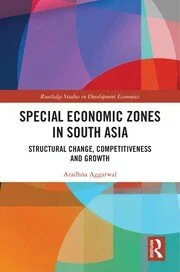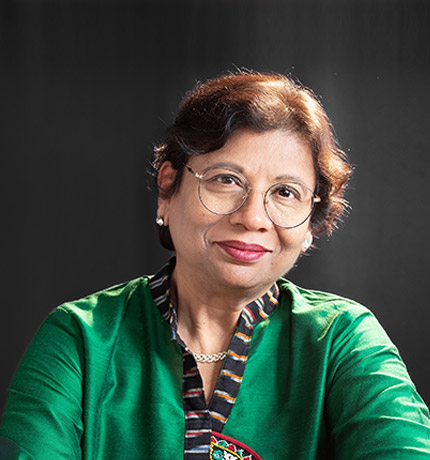SEZ Policy Forum: Connecting Policymakers With Academic Research to Inform SEZ Policy
It is widely recognised that there is a need for evidence informed policy making. However, convincing policymakers to connect with academic research for informed public policy has never been easy. With heightened partisanship, the challenge is becoming even more daunting. I experienced it when I set out to organise a half a day Policy Forum on SEZ policy, as a team member of the International Consortium of Academic Institutions on SEZs, in partnership with Export Promotion Council of EoUs and SEZs (EPCES). The Consortium consists of five academic institutions from five different countries: Kiel Institute of World Economy (Germany), Copenhagen Business School (Denmark), Jadhavpur University (India), Ghana University (Ghana) and Vietnam Institute for Development Strategies, Ministry of Planning and Investment (Vietnam). It is funded by Riksbanken Jubileums fonden, Sweden through a research grant and is led by Professor Holger Goerg of the Kiel Institute. The EPCES on the other hand is a government initiated body under the administrative control of the Department of Commerce, Government of India and is one of fourteen Export Promotion Councils in the country. The EPCES administration needed to be convinced about the value of this collaboration. There was a perception that academic research is disconnected with the real-world nature of policymaking. However, after several rounds of negotiations and a big push given by the Chairman of the Board ( from the private sector), the event finally became a reality. It was organized on 26 March 2024 at Taj Mahal Hotel. The Chief Guest at the Forum was Mr. L. Satya Sri Nivas, the Additional Secretary, SEZs at Ministry of Commerce and Industry. Attended by over 100 participants from academics, bureaucrats, professionals, SEZ developers and SEZ units, it was a unique academia- government collaboration where academic rigor was blended with practical expertise of bureaucrats.
The event was organised in three sessions. The inaugural session was dedicated to international perspective on SEZs. Of the two academic presentations, the one made by me dwelled upon how SEZs in Asia have evolved and transitioned over time from being export processing zones to special economic zones targeting a variety of broader objectives including FDI promotion, infrastructure development, targeted industrialization, urbanization, border development, regional integration, and economic diplomacy. The incentive packages and facilities are designed based on the objectives set out for the SEZs. I also promoted my concept of SEZ as ‘special experimental zones’ which I have also proposed in my articles on SEZs. Tran Toan Thang of Vietnam focused on the SEZ experience of Vietnam. He highlighted the role of FDI in driving exports and employment in Vietnam and attributed Vietnam’s success in attracting FDI to a variety of factors including the proliferation of economic zones since 1991. He also talked about the challenges facing Vietnamese economy related to urbanization, skill development and attraction of high value added FDI in new emerging sectors and policy reforms to address these challenges. The Chief Guest released my book titled ‘Special economic zones in South Asia: Structural Change, competitiveness and growth’ published by Routledge, presented and in his address presented the government perspective on SEZs in India. His address highlighted how the SEZ Act 2005 gave a major push to SEZs in India and how the SEZs have been contributing to national exports. He appreciated the idea of promoting SEZs as test laboratories for policy experimentation and talked about recent reforms in the SEZ policy to give a thrust to them. The floor discussion that followed was mainly focused on the future of SEZs in India. The participants wanted to know whether SEZs would be replaced by a new variety of zones or there would be amendments in the SEZ Act. Mr. Sri Nivas assured some favourable amendments in the Act in the future to make the SEZs a potential tool for investment and infrastructure development.
The inaugural session was followed by two technical sessions. There were 4 academic presentations in Technical session I. Cecillia from Kiel Institute presented a paper on the impact of SEZs on household consumption based on empirical evidence for 10 African countries: Egypt, Ethiopia, Ghana, Kenya, Mali, Mozambique, Nigeria, Tanzania, Uganda, Zambia drawn on Demographic and Health Surveys data of households living in the vicinity of SEZs over 1990-2020. Ari Kokko, Professor, Copenhagen Business School, Vu Hoang Dat of Viet Nam Academy of Social Science and Tran Toan Thang, Viet Nam Institute for Development Strategies explored the effects of SEZs on employment opportunities and gender wage differential. The study presented by Rajarishi Chaudhury, a PhD candidate of Jadhavpur University delved into the impact of SEZs on land ownership of households in India using the landholding data from National Family Health Surveys (NFHS). Finally, I presented author’s summary of my recently released book, in which I have compared the outcomes of SEZs at the firms level in terms of business conditions. export components, technological capabilities and knowledge spillovers in three countries: India, Bangladesh and Pakistan. and found the impacts by and large positive at the firm level. The four academic research papers from different countries using different sources of data and methodologies find that the SEZs have the potential to extert favourable impacts both at firm and household levels. However the effects remain limited. I argued that SEZs needed to be integrated in overall development strategy to leverage their positive effects at a wider scale.
Finally, Technical Session II was dedicated to panel discussion with panelists from government (Mr. Senthil Nathan S, Director SEZ division Ministry of Commerce and Industry and Mr. Bipin Menon, Development Commissioner Noida SEZ), private sector ( Dr. Ravi Sannareddy), industry organization (Mr. Hitender Mehta, ASSOCHAM and Mr. Khare, MAIT), professionals’ world ( Ms. Bargavi Natesan) and think tank ( Arpita Mukherjee). It was moderated by Dr. Lalit Singhal ( an Indian Trade Service officer with various roles at the Ministry of Commerce; presently in Advisory Board, Rishihood University). The focus was on the development of sustainable infrastructure within SEZs. Mr. Senthil talked about the green initiatives taken under the SEZ policy in India. Mr. Menon focused on sustainability in the context of Noida SEZ while Mr. Sannareddy, founder Sri City highlighted how the business city has been developed with a view to promote sustainable development, economically, socially and environmentally. Other speakers contributed to the discussion by focusing on various aspects of SEZ development including their attractiveness for developers and units to attract more investment in infrastructure in the SEZs. The discussion was concluded by Dr Singhal with an observation that the SEZs may be leveraged to promote sustainable development of infrastructure. However, much will also depend on the capability of SEZs in attracting investment from developers and units.
To conclude, the critical questions are, ‘Will the learnings from academic presentations be integrated into policy making?’ Will the evidence presented by academics be used to reinvigorate, and revamp the positioning and value proposition of SEZs?




Leave a Reply